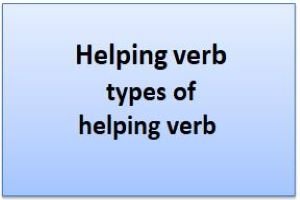Helping verbs examples:
Helping verbs are described as verbs that extend the meaning of the main verb in a phrase. They complete the structure of a phrase by adding information to the main verb. They can also help you understand how time is expressed in a sentence. In order to generate complex progressive and perfect verb tenses, helping verbs are used.
Types of Helping verbs:
Auxiliary Verbs:
Modal Verbs:
Auxiliary Verbs:
Auxiliary verbs is a type of helping verb. They’re used with a primary verb to show the tense of the verb or to create a question or a negative. These auxiliary verbs provide context for the primary verb, such as telling the reader when the action happened.
Auxiliary Verbs add meaning to the sentence (emphasise something) where they are being used or Auxiliary verb is used to express tense.
Auxiliary verb examples: Should, Can, Do, Did, May, Could, Would
Exmples in sentences:
The auxiliary verb is bolded in the following statement, while the verb it helps is highlighted.
- She will go to school after breakfast finishes.
The auxiliary verb will is telling us that the action of the main verb go is going to take place in the future – after breakfast finishes. We get the following sentence if we remove the auxiliary verb “will”.
- She goes to school after breakfast finishes.
Here in this example, for the action, there is no definite time frame. The sentence suggests that going to school after breakfast finish is just something subject I generally do. Other examples:
- She is having a new dress.
- He is making us fool.
- We are planning to switch colleges.
- We have been drinking for over two hours.
Modal Verbs:
Modal verbs are helping verbs that modify the action or meaning of the main verb in a phrase. Modal verbs are used to express possibilities, abilities, obligations, and permissions.
Modal verb examples: Must, Can, May, Would, Should, etc
For easy identification, the modal verb is bolded below.
- She can cook Chinese recipes easily.
The auxiliary verb can be expressing an ability, suggesting that cooking Chinese recipes is a skill the subject possesses.
Please keep in mind that the modal verbs should and must in the examples below indicate obligations, whereas would and may express possibilities.
- you should go to the mall.
- She must not sign.
- John would not recommend the place.
- Marry may be late.

